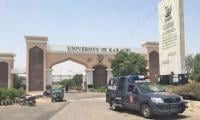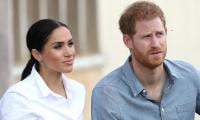BERLIN: Saudi Arabia said Wednesday it will not follow the United Arab Emirates in establishing diplomatic ties with Israel until the Jewish state has signed an internationally recognised peace accord with the Palestinians.
The UAE last week became the first Gulf state to normalise relations with Israel, in a historic US-brokered accord that raised the prospect of similar deals with other Arab states, including Saudi Arabia.
But after days of silence and in the face of US pressure to announce a similar deal, Saudi Arabia’s Foreign Minister Prince Faisal bin Farhan ruled out the possibility until the Palestinian issue is resolved.
"Peace must be achieved with the Palestinians" on the basis of international agreements as a pre-condition for any normalisation of relations, Prince Faisal told reporters during a visit to Berlin.
"Once that is achieved all things are possible," he added, in a comment that was consistent with Saudi Arabia’s previous stance on the issue.
Prince Faisal noted that Saudi Arabia had sponsored the 2002 Arab peace initiative holding out the prospect of a normalisation of ties with Israel, but said Riyadh now saw no road to diplomatic relations without a Palestinian peace deal. He said Saudi Arabia was committed to peace between the Palestinians and Israel based on the Arab peace plan.
Saudi Arabia has long maintained this public stance even as it has cultivated clandestine relations with Israel in recent years, in a shift spearheaded by de facto leader Crown Prince Mohammed bin Salman. Prince Faisal’s remarks are the kingdom’s first official reaction since the UAE´s landmark deal with Israel, which is only the third such accord the Jewish state has struck with an Arab country after Egypt and Jordan.
At a news conference with his German counterpart Heiko Maas, Prince Faisal reiterated criticism of Israel´s "unilateral policies" of annexation and building settlements in the occupied West Bank as "illegitimate" and "detrimental" to a two-state solution.
Until now, Saudi Arabia had maintained a notable silence over the deal even as local officials hinted that Riyadh was unlikely to immediately follow in the footsteps of the UAE, its principle regional ally.
US President Donald Trump´s son-in-law and adviser Jared Kushner insisted on Monday that it would be in Riyadh´s interest to formally establish ties with Israel. Further putting the kingdom in the spotlight, Israeli Prime Minister Benjamin Netanyahu on Monday said Israel was working on opening a corridor over Saudi Arabia for flights to the UAE.
But Saudi Arabia, the Arab world´s biggest economy and home to Islam´s holiest sites, faces more sensitive political calculations than the UAE. Not only would a formal recognition of Israel be seen by Palestinians and their supporters as a betrayal of their cause, it would also hurt the kingdom´s image as the leader of the Islamic world.
"The notion that Saudi Arabia will be next to normalise relations with Israel was far-fetched," said Aziz Alghashian, a lecturer at Essex University specialising in the kingdom´s policy towards Israel.
"The biggest constraint for Saudi-Israeli normalisation is not the fear of a domestic and regional backlash. Rather, Saudi Arabia deems it necessary to not normalise relations outside the framework of the Arab Peace Initiative that called for resolving the Palestinian issue, if it still wants to be seen as the leader of the Muslim and Arab world," Alghashian told AFP.
In 2002 Saudi Arabia sponsored the Arab Peace Initiative which called for Israel´s complete withdrawal from the Palestinian territories occupied after the Six-Day War of 1967, in exchange for peace and the full normalisation of relations.
Russia has slowly been pushing Ukraine back and has retaken a number of villages
In statement posted on X following Trump’s comments, TikTok said it “is in process of restoring service”
Report adds that verdict was not final and can still be appealed
Sheikh Waqas Akram expresses hope that court would order immediate release of Imran Khan and Bushra Bibi
"I'm going to fly away somewhere, somewhere nice. Maybe Colorado," says one retiree
Maryam directs authorities to complete Phase-1 of construction and rehabilitation of health centres by June 30







